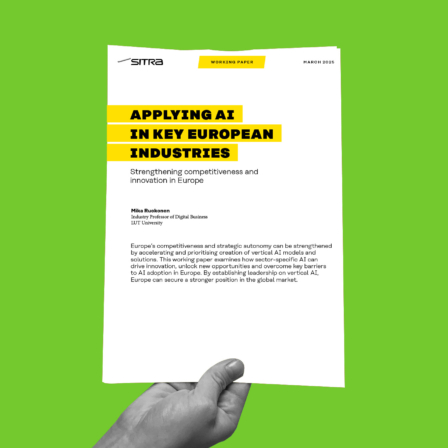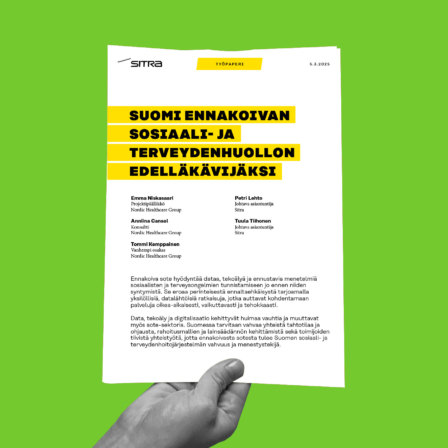Background
The Finnish Innovation Fund Sitra has participated in the European Commission’s public consultation and issued a statement on the EU’s Data Act under preparation.
The Commission presented its data economy vision in February 2020 with the publication of the European strategy for data. The legislative proposal for a Data Act is part of this. It aims to propose measures to create a fair data economy and ensure access to and use of data, including in business-to-business and business-to-government situations.
One of the objectives of the Data Act is to promote business-to-government data sharing for the public interest. This is means benefits for society as a whole, whether it is responding to disasters or improving to public services.
According to the Commission, access to private sector data could provide public authorities in the EU with valuable information, for example to improve public transport, tackle epidemics and develop more evidence-based policies. Businesses can be incentivised to share data in this manner through various incentives, for example.
The Commission has assessed that fair contractual terms between businesses could encourage them to share data. In the present situation, this is not sufficiently the case due, among other things, to the desire of businesses to protect confidential information.
The proposed Data Act is not intended to change data protection legislation. The views collected in the consultation will help shape the Data Act.
The public consultation is divided into the following sections:
- business-to-government data sharing for the public interest
- business-to-business data sharing
- data sharing tools: smart contracts
- clarification of rights concerning non-personal data from professional use of Internet-of-Things data
- improving portability for business users of cloud services
- complementing the right of portability under Article 20 GDPR
- Intellectual Property Rights – Protection of Databases
- safeguards for non-personal data in international contexts
Sitra’s main observations
Sitra believes that Europe should influence the development of the global digital market in accordance with European values. For example, the GDPR has spread beyond Europe as part of EU’s trade policy and trade agreements.
Sitra emphasises that new fair data economy business models can strengthen Europe’s competitiveness. Europe’s potential needs to be considered alongside the strengthening of the European digital internal market.
Sitra considers it important that the relationship between the Data Act and other legislation, such as the Data Governance Act and the GDPR, is further clarified and that its impact on national legislation is thoroughly assessed.
Sitra believes that revising the contractual terms of data sharing so that one party could not unilaterally impose unfair contractual terms on the other could increase data sharing between companies. In order to further increase the fair sharing of data, the party sharing data should obtain a reasonable return. The party gaining access to the data should in turn pay a reasonable fee.
Regarding smart contracts, Sitra believes that the primary challenges for scaling up smart contracts across blockchains or ecosystems are related to legal uncertainty and data protection issues. Smart contracts are computer programmes that automate data transfers and data aggregation according to certain parameters. Smart contracts offer opportunities in areas such as smart transport , smart manufacturing and smart energy.
Sitra believes that smart contracts can improve contract management, supervision and trust, as well as the efficiency of processes. This can also bring savings.
Sitra’s statement can be read in full in the document attached to this article and on the Commission’s website.
Further information
Read Sitra’s full statement on the EU’s proposal for a Data Act (pdf).
The Commission’s public consultation
















Recommended
Have some more.